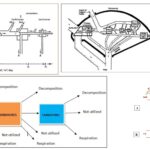AQA GCSE Biology 21 Views 1 Answers
Sourav PanLv 9November 12, 2024
Which hormones are involved in the menstrual cycle, and what are their specific roles?
Which hormones are involved in the menstrual cycle, and what are their specific roles?
Please login to save the post
Please login to submit an answer.
Sourav PanLv 9May 15, 2025
The menstrual cycle is regulated by a complex interplay of hormones that orchestrate the various phases of the cycle. The key hormones involved include:
1. Gonadotropin-Releasing Hormone (GnRH)
- Source: Produced in the hypothalamus.
- Role: GnRH stimulates the anterior pituitary gland to release FSH and LH. Its pulsatile secretion is crucial for the regulation of the menstrual cycle.
2. Follicle-Stimulating Hormone (FSH)
- Source: Secreted by the anterior pituitary gland.
- Role: FSH promotes the growth and maturation of ovarian follicles during the follicular phase. It also stimulates the follicles to produce estrogen.
3. Luteinizing Hormone (LH)
- Source: Also secreted by the anterior pituitary gland.
- Role: LH is responsible for triggering ovulation, which occurs when a mature follicle releases an egg. It also supports the formation of the corpus luteum after ovulation, which produces progesterone.
4. Estrogen
- Source: Primarily produced by developing ovarian follicles.
- Role: Estrogen levels rise during the follicular phase, leading to thickening of the endometrial lining in preparation for potential implantation of a fertilized egg. It also regulates FSH and LH through feedback mechanisms.
5. Progesterone
- Source: Produced by the corpus luteum after ovulation.
- Role: Progesterone prepares the endometrium for implantation by further thickening it and promoting vascularization. If pregnancy does not occur, progesterone levels drop, leading to menstruation as the endometrial lining sheds.
Summary of Hormonal Roles in the Menstrual Cycle
- Follicular Phase: FSH stimulates follicle development and estrogen production, leading to endometrial proliferation.
- Ovulation: A surge in LH triggers ovulation, releasing a mature egg.
- Luteal Phase: The corpus luteum secretes progesterone, maintaining the endometrial lining for potential implantation.
0
0 likes
- Share on Facebook
- Share on Twitter
- Share on LinkedIn
0 found this helpful out of 0 votes
Helpful: 0%
Helpful: 0%
Was this page helpful?




